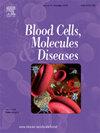HLA-DQ在严重再生障碍性贫血系统免疫激活中作用的分子机制。
IF 2.1
4区 医学
Q3 HEMATOLOGY
引用次数: 0
摘要
严重再生障碍性贫血(SAA)是一种由自身免疫功能障碍引起的骨髓衰竭性疾病。树突状细胞(DC)的呈递是SAA患者启动针对未知抗原的免疫反应的关键步骤。在前一阶段,我们发现与健康对照组相比,SAA患者的循环髓系/常规树突状细胞(mDCs/cDCs)比例增加,吞噬功能增强,骨髓中Th1型细胞因子(IL-2、TNF-α、IFN-γ)分泌增多,Treg细胞比例降低。在本研究中,我们发现从SAA患者中分离的cDC的HLA-DQ、共刺激分子CD86、PTK和ERK1/2的表达水平高于缓解期SAA患者和健康对照。此外,SAA患者来源的cDC上HLA-DQ蛋白水平的下调导致cDC的吞噬率和CD86表达降低。当上述cDC与来自相同患者的CD4+细胞共培养时,观察到Th1型淋巴细胞细胞因子的分泌减少。临床相关数据分析表明,HLA-DQ的表达水平与疾病的严重程度和患者的免疫状态密切相关。这些发现表明,HLA-DQ在SAA免疫发病中的作用具有潜在的重要意义,值得进一步研究。本文章由计算机程序翻译,如有差异,请以英文原文为准。
Molecular mechanisms underlying the role of HLA-DQ in systemic immune activation in severe aplastic anemia.
Severe aplastic anemia (SAA) is a bone marrow failure disorder caused by autoimmune dysfunction. The presentation by dendritic cells (DCs) is the key step in initiating the immune response against unknown antigens in SAA patients. In the previous phase, we found that compared to healthy controls, patients with SAA had an increased proportion of circulating myeloid/conventional dendritic cells (mDCs/cDCs) with enhanced phagocytosis, more secretion of Th1-type cytokines (IL-2, TNF-α, IFN-γ) in the bone marrow, and a reduced proportion of Treg cells. In this study, we found that cDCs sorted from SAA patients had higher expression level of HLA-DQ, co-stimulatory molecules CD86, PTK and ERK1/2 than the remission SAA patients and healthy controls. Moreover, downregulation of HLA-DQ protein levels on cDCs derived from SAA patients resulted in reduced phagocytosis rate and CD86 expression of cDCs. When the cDCs above were co-cultured with CD4+ cells from the same patients, reduced secretion of Th1 type of lymphocyte cytokines was observed. Analysis of clinically relevant data suggests that HLA-DQ expression levels were closely related to disease severity and immune status of patients. These findings show that the role of HLA-DQ in the immunopathogenesis of SAA is potentially important and worth further study.
求助全文
通过发布文献求助,成功后即可免费获取论文全文。
去求助
来源期刊
CiteScore
4.90
自引率
0.00%
发文量
42
审稿时长
14 days
期刊介绍:
Blood Cells, Molecules & Diseases emphasizes not only blood cells, but also covers the molecular basis of hematologic disease and studies of the diseases themselves. This is an invaluable resource to all those interested in the study of hematology, cell biology, immunology, and human genetics.

 求助内容:
求助内容: 应助结果提醒方式:
应助结果提醒方式:


